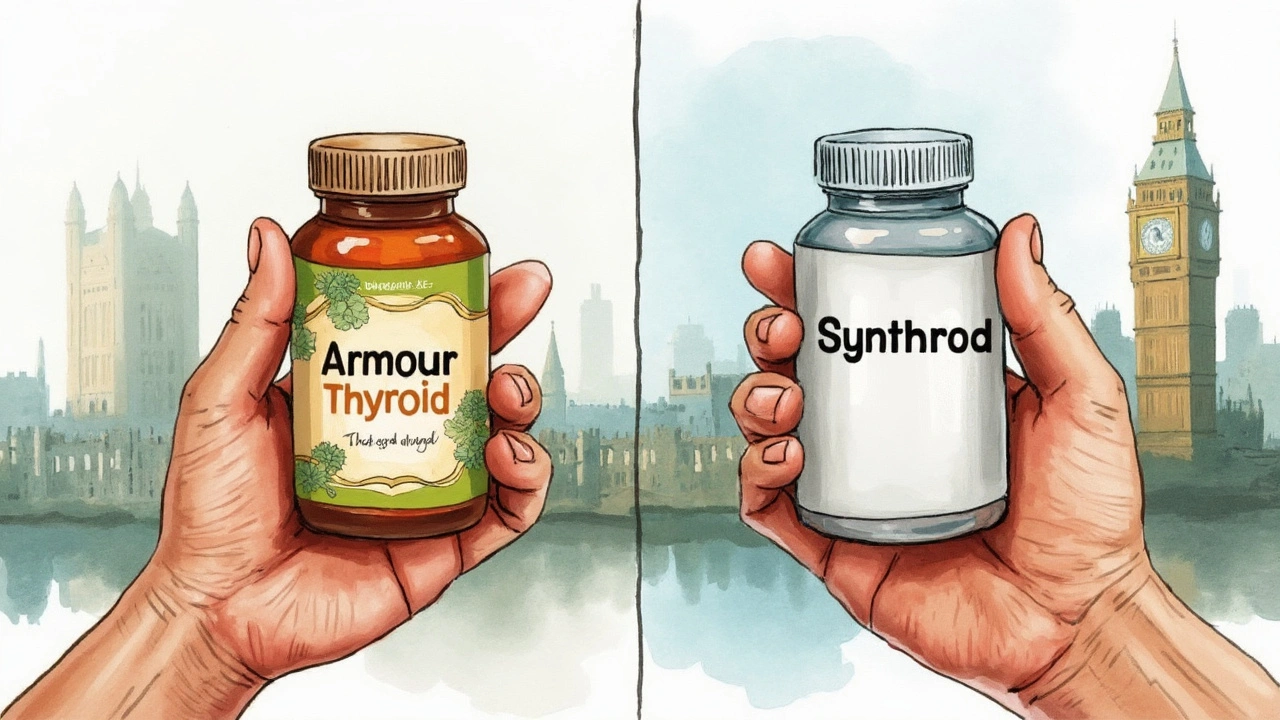Understanding Armour Thyroid: What Makes It Different?
Most folks dealing with hypothyroidism have heard of levothyroxine (the generic for Synthroid), but Armour Thyroid is a different animal—literally. Armour Thyroid is a natural, desiccated thyroid extract made from the glands of pigs. Unlike synthetic options that only give you T4, Armour Thyroid packs both T4 and T3 hormones. Your body turns T4 into T3, but some people’s systems struggle with that conversion, so a medication that offers both can hit differently. Some folks say they feel more energetic and balanced on Armour. But before you jump in, it helps to know why this old-school med even has a following. It’s been around for over 100 years—older than most synthetic thyroid meds. Back in the day, it was the main treatment for thyroid problems. Even now, thousands swear by it. The catch? Its ingredients are derived from pigs, making it a non-vegan and non-kosher choice. And because it’s technically a ‘natural’ product, there are some quirks in how much hormone each tablet delivers. Unlike lab-synthesized meds, slight batch-to-batch hormone differences are possible.
Why does any of this matter? Some people absorb or convert thyroid hormone differently. With Synthroid or other synthetic options, doctors prescribe just T4, banking on your body to handle the rest. But if you’re someone whose symptoms don’t improve, or if you still feel brain fogged and sluggish with a ‘normal’ TSH, it’s easy to want to try something like Armour, which gives you direct access to T3. There aren’t huge clinical trials comparing Armour with levothyroxine head-to-head, but some smaller studies and plenty of testimonials suggest that for certain people, especially those who don’t do well on T4-only meds, Armour can be a game changer. It’s not a fit for everyone, but the blend of hormones and old-school approach gives it a loyal fan base—and plenty of controversy too.
A huge thing to keep in mind is how the body responds depends on individual thyroid status, other health conditions, and genetics. Armour Thyroid might help some people feel normal again, but in others, it can stir up new problems. Some find the dosing finicky or get side effects like palpitations or anxiety as the T3 acts quickly. It’s important to work closely with a doctor, ideally one who knows the ins and outs of natural desiccated thyroid. And if you're curious what else is out there besides Armour or Synthroid, don't miss this handy roundup of alternatives to Armour Thyroid with a rundown of best choices for 2024. A savvy patient is a safe patient—so let’s dig into the nitty-gritty details before you swap your prescription.
The Benefits: Why Do People Choose Armour Thyroid?
One thing keeps popping up when folks talk about why they switched to Armour Thyroid: symptoms that just wouldn’t quit. Brain fog, hair loss, constant fatigue—even after months or years on synthetic thyroid meds. Armour delivers both T4 and T3, so if your body can’t convert T4 efficiently, this combo can make a real difference. Imagine waking up without hitting snooze five times, or finally feeling warm when everyone else does. It sounds simple, but living with hypothyroid symptoms drags down your whole life. There are also anecdotal reports of weight finally budging, less depression, improved skin and nails, and better focus. Clinical research is mixed—one 2013 study found some patients preferred desiccated thyroid like Armour over levothyroxine, citing improved mood and energy, even though lab results stayed similar.
Another reason people go for Armour? The natural angle. While “natural” doesn’t always mean better, some patients are uneasy about synthetic medications and gravitate towards treatments with a long track record. Armour’s been around long enough to see trends come and go, and many holistic or integrative doctors recommend it for those who want to avoid artificial ingredients. For people sensitive to synthetic fillers or dyes, Armour’s formulation sometimes just “sits better”—less stomach upset, fewer allergic responses. Each tablet contains a specific blend of thyroid hormones: 38 micrograms T4 and 9 micrograms T3 in a 60 mg ‘1 grain’ tablet, for example. Those numbers matter, because T3 is much stronger and more fast-acting than T4, so a little bit can go a long way in how you feel day to day.
Then there’s the issue of blood work. Some people on levothyroxine can have normal or even low TSH, but feel out of sorts, hinting at possible “tissue hypothyroidism”—your blood levels look fine, but your body’s tissues aren’t getting what they need. Armour Thyroid gives more T3 right away, which can quickly boost metabolism, cognition, and energy. The irony? Many doctors resist using Armour due to older guidelines, variability in dosing, and a stigma that it’s “outdated.” Still, the online thyroid community is alive with people who feel like Armour finally gave them their lives back. One tip: if you go this route, symptom tracking is key. Keep notes about your energy, sleep, anxiety, and weight. That way, you can spot patterns and work with your doctor to dial in your dose for the best balance.

The Risks and Side Effects: What Can Go Wrong?
Armour Thyroid isn’t all sunshine. The flip side to its fast-acting T3 is a risk for side effects, especially if your dose is even a little too high. Some folks report heart palpitations, jitteriness, sweaty palms, anxiety, trouble sleeping, or pounding heartbeat. Because T3 kicks in faster, having too much on board—especially if you miss a dose and double up—can make you feel like you’ve chugged a dozen energy drinks. This can be dangerous if you have heart disease, arrhythmias, or high blood pressure. Another red flag: Armour can worsen osteoporosis in people who are over-dosed, since extra thyroid hormone speeds up bone loss. It’s a classic case of ‘a little is good, but too much is bad.’
For folks with autoimmune thyroid disease (like Hashimoto’s), Armour might not be the ideal choice. There’s always a chance for your immune system to react to the pig proteins, causing more inflammation. People with allergies to pork or animal-derived products definitely should rethink this med. Plus, because the amount of hormone isn’t always as precisely measured as with synthetics, dose stability can be an issue. You might feel great on one bottle and less so on another, especially if the batch-to-batch variability creeps in. Most big pharmacies now double-check for consistency, but perfection isn’t guaranteed.
Drug interactions matter more than people think. Cholesterol meds, certain antidepressants, iron and calcium supplements, and even coffee can mess with Armour absorption. It’s smart to take it first thing in the morning, well before any other pills—or coffee. And let’s not forget: if you’re pregnant, Armour Thyroid isn’t always the best option, since dosing changes a lot as hormones fluctuate. Thyroid storm (a life-threatening overactive thyroid crisis) is rare but real if you take way too much. Regular follow-up with labs and vigilant symptom tracking are non-negotiable with any thyroid replacement, but especially with desiccated thyroid.
Armour Thyroid Dosing: How to Find Your Sweet Spot
Dosing Armour Thyroid isn’t as simple as copy-pasting the dose you got from your last bottle of Synthroid. It comes in grains—not milligrams or micrograms—so just matching numbers won’t cut it. A 1-grain (60 mg) tablet equals roughly 100 mcg of levothyroxine, but the kicker is, Armour packs both T4 and T3. This changes everything about how it works and how you feel. Dosing usually starts low and is raised every few weeks depending on labs and symptoms. Doctors are careful with the T3 part, since too much gives side effects fast. Most people start with half a grain and work up slowly. The goal is to find the Goldilocks zone—you want your TSH, T4, and T3 in range, but also want to feel good, not wired or anxious.
It’s crucial to stick with the same brand and formulation, even the generic versions, if possible. Different brands of desiccated thyroid aren’t identical in hormone content. Splitting pills isn’t recommended unless your doctor tells you how, since T3 and T4 may not distribute evenly within each tablet—that’s tiny but it makes a difference for sensitive folks. Check in with your doctor after every dose change. Labs should include TSH, free T4, and free T3 (not just TSH—ask specifically for these). The fastest-acting hormone in Armour, T3, peaks in 2-4 hours, so if you take your dose in the morning, labs drawn a few hours later can show a transient spike that doesn’t reflect your real average levels. Try to time your labs 24 hours after your last dose for a more reliable result.
Here are some practical tips for dosing success:
- Take Armour Thyroid on an empty stomach, at least 30-60 minutes before breakfast or coffee.
- If you take calcium, iron, antacids, or certain cholesterol drugs, separate these by at least 4 hours.
- Consistency with timing every day helps avoid hormone swings.
- Don’t change your dose without talking to your doctor, even if you feel off—too little and you’ll feel sluggish, too much and you risk dangerous side effects.
- Have your thyroid labs checked every 6-12 weeks after each dose change, then twice a year once stable.







Jaime Torres
April 26, 2025 AT 20:43Armour Thyroid sounds like a gamble.
Wayne Adler
April 26, 2025 AT 21:33It’s weird how we chase “natural” solutions like a mirage in the desert, thinking they’ll fix the inner void we feel. The body is a complex orchestra and the hormone balance is the conductor, yet we often blame the instrument when the score is off. I feel for anyone stuck in the endless cycle of lab tests and trial‑and‑error, it’s exhausting. Yet diving headfirst into a pig‑derived hormone without a solid plan is reacless and could backfire badly. The hype around Armour sometimes feels like a cult, promising miracles while ignoring the science. People forget that even a “natural” pill can cause palpitations, anxiety, and bone loss if mis‑dosed. I’m angry that doctors sometimes dismiss patient experiences just because they dont fit the textbook narrative. Ultimately, we need a balanced approach, not blind worship of any single therapy.
Shane Hall
April 26, 2025 AT 21:35First off, let me say that navigating thyroid medication is nothing short of an epic quest, and you deserve a guide who’s got your back.
Armour Thyroid can be a real hero for those whose bodies balk at converting T4 to T3, delivering that missing spark of energy.
But like any legendary tool, it comes with a weighty responsibility to wield it wisely.
Start low-half a grain is often enough to test the waters, and then inch upward only after your labs and symptoms give you a green light.
Remember to take it on an empty stomach, at least thirty minutes before any coffee or breakfast, because even a splash of acid can sabotage absorption.
If you’re also on calcium or iron supplements, separate those by four hours; otherwise you’ll be throwing away precious hormone.
Track your daily vibe: energy levels, sleep quality, heart rate, and even mood swings-write it down, because the numbers on a lab sheet don’t tell the whole story.
A sudden jittery feeling or racing heart after a dose bump is your body screaming “too much!” and you should dial back immediately.
Don’t forget that bone health can take a hit if you’re consistently overshooting, especially if you have underlying osteoporosis risk.
Regular check‑ins with a thyroid‑savvy physician-one who orders TSH, free T4, and free T3-not just the generic TSH-are non‑negotiable.
When labs are drawn, aim for a steady‑state window, typically 24 hours after your last dose, to avoid the transient T3 spike.
If you ever feel a wave of anxiety that feels out of character, consider that the T3 component of Armour peaks in two to four hours and may be latching onto your nervous system.
In my experience, patients who combine this regimen with a balanced diet rich in selenium and zinc see a smoother ride, because those minerals support thyroid conversion.
And for those who are vegan or have pork allergies, there are alternative desiccated thyroid sources that might be more suitable.
Never ignore the power of consistency-take your pill at the same time each day, and you’ll keep the hormonal rollercoaster from becoming a nightmare.
Bottom line: Armour Thyroid can be a lifesaver, but only when you treat it with the respect, patience, and meticulous tracking that any epic hero deserves.
Christopher Montenegro
April 26, 2025 AT 22:40From a pharmacovigilance standpoint, the utilization of desiccated thyroid extracts such as Armour Thyroid introduces a non‑negligible variance in pharmacokinetic parameters, thereby compromising therapeutic index predictability. The heterogeneous peptide composition inherent to animal‑derived preparations contravenes the principles of standardization demanded by contemporary endocrine replacement protocols. Moreover, the proclivity of clinicians to endorse Armour without rigorous, double‑blind, randomized controlled evidence reflects a pernicious deviation from evidence‑based medicine. The potential for iatrogenic thyrotoxicosis, exacerbated by T3 hyperactivity, warrants unequivocal caution, particularly in patients with comorbid cardiovascular pathology. It is incumbent upon prescribers to eschew anecdotal bias and to prioritize levothyroxine formulations whose dosage precision aligns with FDA‑mandated bioequivalence criteria. In sum, the perpetuation of Armour Thyroid within mainstream practice constitutes a methodological oversight that undermines patient safety.
Kyle Olsen
April 26, 2025 AT 22:41Behold, the saga of Armour Thyroid-a tale replete with mythic proclamations of revitalized vigor and the occasional descent into cardiac pandemonium. As a connoisseur of endocrine therapeutics, I must assert that the allure of “natural” is but a siren song, luring the unsuspecting toward dosage turbulence. One must appreciate the meticulous titration required; a mere half‑grain miscalculation can evoke palpitations reminiscent of a runaway locomotive. Thus, while the product boasts a century‑old pedigree, the modern clinician must wield it with surgical precision, lest the drama turn tragic.